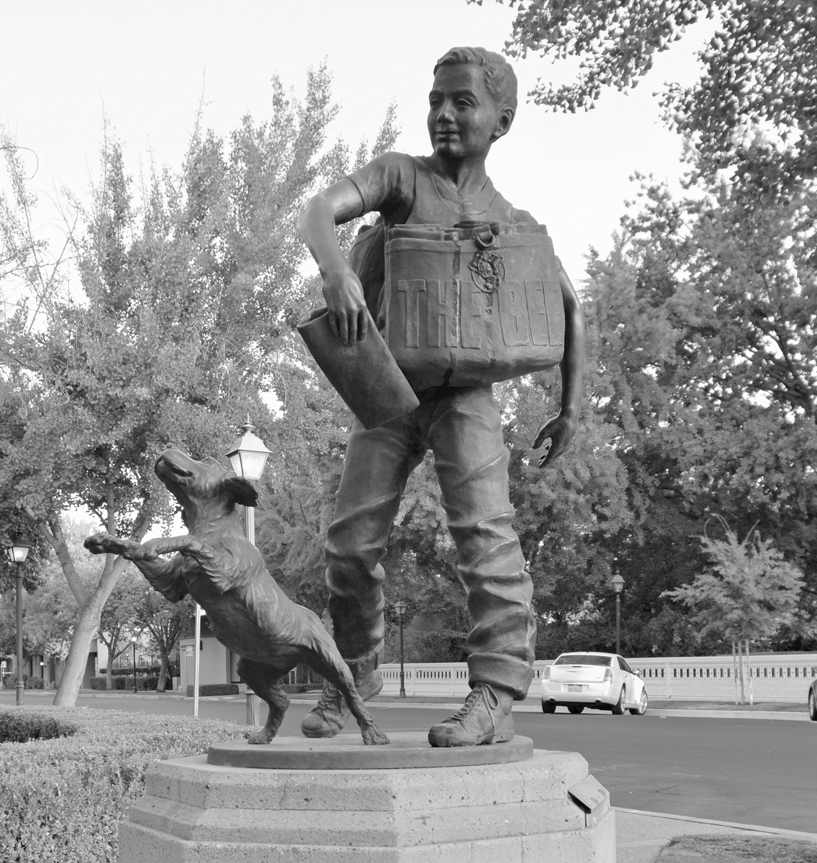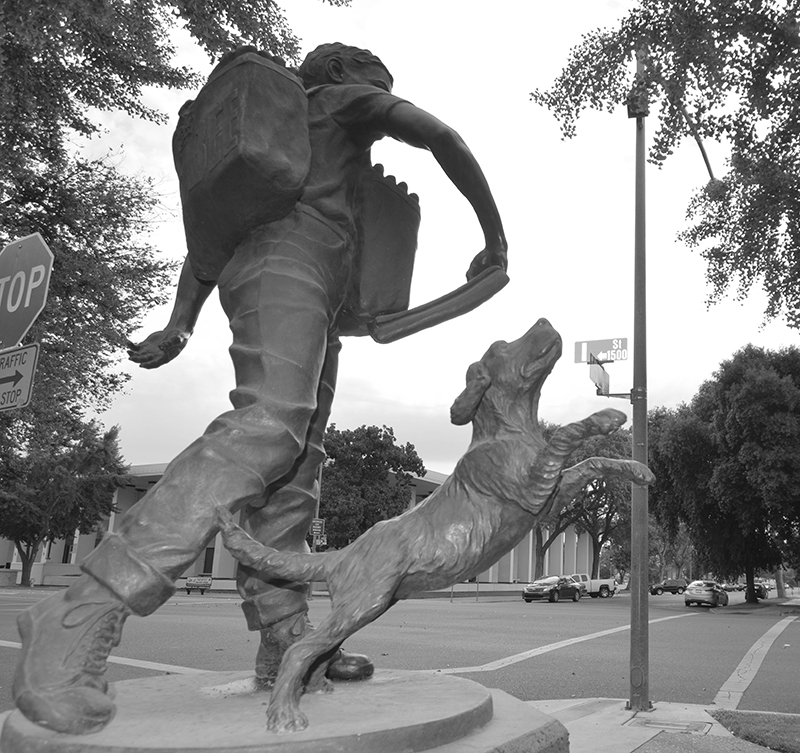The Valley Citizen is an essay in public journalism, dedicated to the memory of John Michael Flint, an honest man and a fine writer. That’s his image on the masthead.
Public journalism is meant to promote civic awareness and engagement. Among our most grievous losses over the last forty years has been the steady loss of civic engagement by members of the middle and laboring classes. Newspapers have traditionally played a fundamental part in encouraging active citizenship by raising issues and providing a platform for public discourse.
Unfortunately, newspapers, especially local newspapers, are dying. Social media and new merchandising platforms have taken away major revenue sources. Moreover, a decades-long drift away from hard news reporting and analysis toward infotainment has dulled our minds and sharpened our appetites for sensation
Today’s media have elevated sensationalism, superstition and rumor to heights enough to blot the sun. Today, our media landscape includes a corporation of self-confessed liars that recently paid almost $800 million to avoid having to appear in a court of law where the lies, misinformation and disinformation spewed by its most popular spokespeople would have been laid bare in precise detail.
Powered by memes that captivate our minds and murder reason, today’s media have enabled the construction of alternate realities that depend on constant (re)construction through endless repetition of demonstrable falsehoods.
As a result of different sources of information, especially from those that lie without shame, the American people inhabit two different worlds, with multiple sedimentary differences between them. As we launch an updated version of our humble journal, we remain hopeful that the basic goodness and decency of these same American people will provide the common ground we need to heal the wounds incurred during these last eight tumultuous years.
Honest journalism with a local focus is one way to bring back communities and consensus. It’s also a way to preserve reading and writing, two endangered practices that have thus far helped cast a guiding light on our journey through the dark places of the human condition.
Yes, the written word can often lead us astray, but the advantage of writing is that it is more durable and therefore more subject to review and critical thinking than the ephemeral emissions of social media and bogus news, which amount to a constant blizzard of repetitive sensations that melt away like snowflakes on a warm window, only to be followed by another sensational blizzard. The effects are dazzling, transitory, and misleading. The intended results are the extirpation of reason, learning and law.
Politics and government at state and local levels are ultimately about the distribution of resources, especially the distribution of tax dollars. Tax dollars are more equitably distributed when more people understand how government works. Consider that during the Bay Area tech boom, city streets were filling with homeless people, the poorest of the poor. The money from the tech boom didn’t trickle down.
That same dynamic operated in the San Joaquin Valley during the nut boom. As almond and pistachio markets expanded globally, Valley agriculture became Valley export. Nut acreage expanded exponentially. Many farmers became multi-millionaires and the owners of Big Ag became billionaires.
Meanwhile, Valley cities were dying. Money from the nut boom didn’t trickle down. The percentage of poverty in the San Joaquin Valley is among the highest rates in a state where “nearly 76% of poor Californians lived in families with a least one working adult.” In fact, throughout the entire San Joaquin Valley, the share of workers living in poverty is well over 20%.
California, which has the fifth largest economy in the world, also has by far the largest homeless population in the United States. Federal, state and local leaders have failed to alleviate homelessness because they don’t have the political will. Only an informed and vocal public can stiffen their spines and spur them to action.
Arguments about the causes of homelessness do nothing to mitigate it, nor do food fights between Republicans and Democrats. What we have forgotten in our rush to blame others for our problems is American pragmatism. We’re at our best when we work together.
Before we can work together, however, we need to agree on what our problems are. Local journalism can help us identify our needs and shortcomings and work together toward practical solutions. Historically, our best problem-solvers have been coalitions of people working toward common goals, led by civic-minded citizens whose interest begins locally and then establishes its place within the larger context of the state and nation. Public journalism with a local focus is one pathway toward forming coalitions of citizens working toward the public interest.
Donations
Many thanks to those of you who’ve made donations. I received some checks made out to “The Valley Citizen.” Those could not be cashed because I never applied for a business license. Best to donate through the Pay Pal feature with the “Donate” button. All donations have been used for developers’ fees, hosting fees, and equipment needed to carry on, including camera equipment.
Business
Among the most common topics when I’m discussing the Valley Citizen with friends and acquaintances is money. People want to know why I don’t have ads and how many hits the site gets. They find it difficult to believe I haven’t tried to monetize The Valley Citizen. Instead, subscriptions are free. Just go to the bottom of the front page and enter your email address.
There are a few reasons why I haven’t tried to make The Valley Citizen a business proposition. First, I’m both old and dealing with routine assaults on my health, so I haven’t had enough energy to both write and build a business.
Second, the proper way to develop a local press is through patronage and subscriptions. Though advertising has its value, it also creates dependencies that can shape coverage. The quest for readers (“hits” in today’s vernacular) can lead to pandering in the form of sensational crime stories, culture war hot buttons, and pages that feature local entertainment venues, restaurants, sports, ribbon cuttings and public celebrations at the expense of less popular coverage of things like city and county government.
I haven’t tried to charge readers because I haven’t been able to provide enough content to justify charges. It’s too big a task for someone as old and impaired as I am. What I’ve done is provide a template, a tone, and a passion. Hired staff would produce more content. That coverage could include oversight not just on elected officials but also on the committees, agencies and individuals that drive local policy, almost always without public scrutiny or accountability. Five thousand readers at $100/yr would provide close, even microscopic, coverage of government and policy in any given county or congressional district, with capacity enough to include broader coverage throughout the San Joaquin Valley, defined as San Joaquin County on the north end and Kern County on the south.
Staff could include retired journalists and teachers, up and coming writers, as well as volunteer essayists in such fields as current events, the arts, politics, natural history, and the environment. A few laptops and a small office and we’re good to go. That’s how public journalism should operate anyway.
In addition to hired staff, public journalism benefits from contributions in the form of writing and photography by public-spirited citizens. We’ve been proud to publish Bruce Frohman, Tom Portwood, Babette Nunes Wagner, the late Dr. Vance Kennedy, Dr. Richard Anderson, Jim Gain and many others whose fine work rivals that of the best local professionals. We’re also deeply appreciative of Susan Henley Spreitzer for web design development.
People need to be knowledgeable about local government and policy. The only way they can attain that knowledge is through clear, concise reporting and analysis. Analysis not only establishes meaningful patterns, it provides crucial context. Absent context and patterns, there’s no true knowledge.
Good journalism doesn’t just report, it reveals. It also requires the courage to report unpleasant facts and readers who prefer truth to the bliss of ignorance, no matter how disturbing.
As for bias, slant or agendas, we would hope to have all three. There are things we’re in favor of and things we’re against. It would be self-defeating to do anything other than promote the one and discourage the other. Let me add, however, that without honesty in the pursuit of truth, partisanship degenerates into vice. The things we’re for are mostly specific and local even though the driving principles for their establishment are abstract and universal.
For example, we might have the specific goal of reducing or mitigating local poverty. The driving principle for such a goal would contain a specific maxim, something like, “Poverty in the midst of plenty should be reduced.” Such a claim brings about an immediate question. Why?
The answers to “why” will ultimately invoke more general or even universal values, something like, “charity,” or, “the public good.” Enacting such values depends on active citizenship. We are trying to reach consensus and community by pursuing truth toward justice. We hope you’ll come along.
About I
The Valley Citizen is dedicated to the memory of John Michael Flint. That’s his image on our masthead.
John Flint was a confirmed libertarian and most likely would have disagreed with a lot of what we’ve written and will continue to write. But I know he would have liked our local focus and ongoing attempts to be as informed and factual as possible.
John and I were fellow Community Columnists for the Modesto Bee for well over a decade, and we met often, usually on a weekly basis. John followed local politics with a keen interest and an almost photographic memory. He was a wonderful raconteur and conversationalist, and especially loved talking about local news.
From the very beginning of his tenure as a Community Columnist, John was by far the most popular local writer on the Bee’s Opinion Page. He was witty, informed, and well read. Most of all, he cared.
John would have lamented the decline in journalism we’re seeing today, and most especially the decline in local journalism. He believed firmly that democracy depends on an informed citizenry. He took on the responsibility of being informed by reading, attending city council meetings and supervisors’ meetings, and generally discharging what he saw as his civic duty as diligently as he could.
“Civic,” or “public” journalism is journalism that attempts to both inform and engage. We’re committed to writing about issues of local interest in hopes of engaging valley citizens in the ongoing project of government of, by, and for the people. We think an essential element in that project is local journalism, and we hope to keep local journalism alive through these dark days. We see better days ahead.
But we also see that the future of local journalism is most likely through subscription and community support. Subscriptions to The Valley Citizen today are free, but we gladly accept donations. We want to grow and we’ll need your help.
Eric Caine


